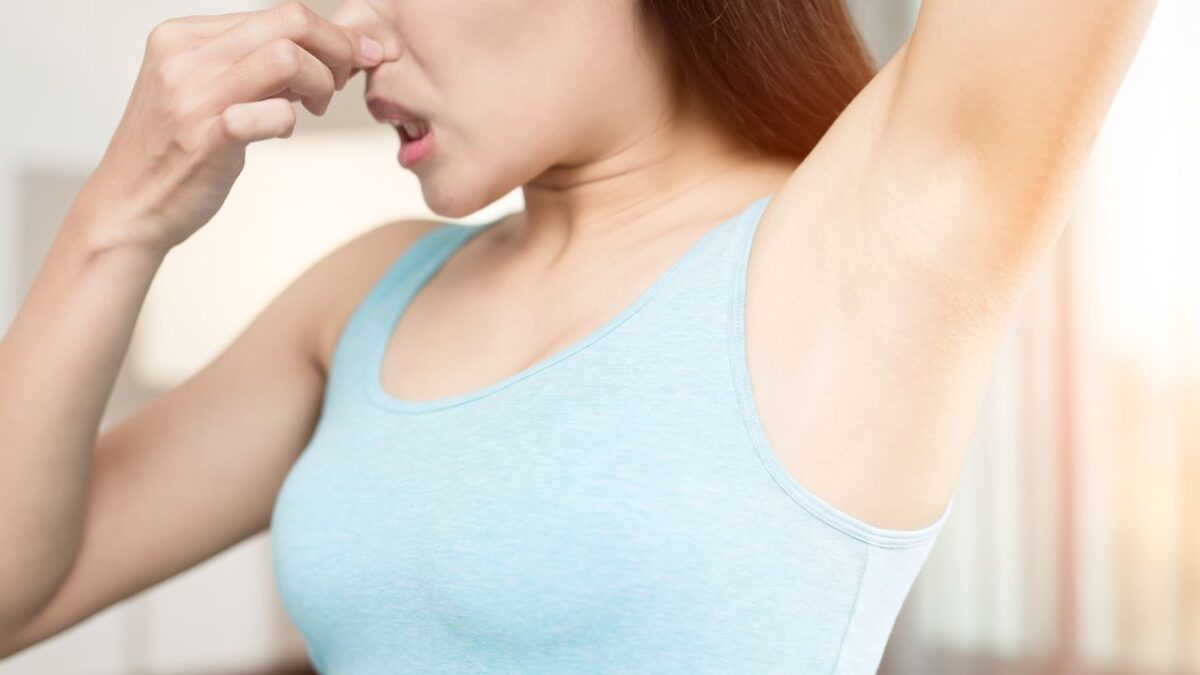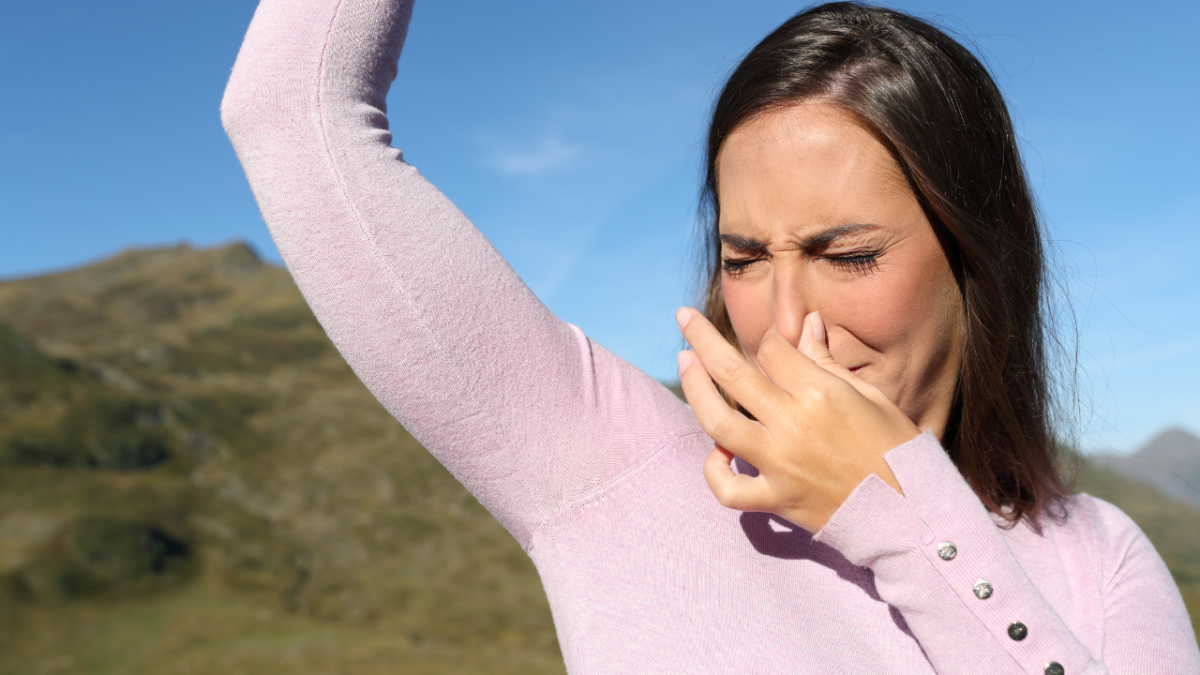Is That… Me? Why Perimenopause Can Change Your Body Odor
One day, you catch a whiff of something not quite right—and to your horror, it’s coming from you. If you’re in your 40s or early 50s and going through perimenopause, this change in body odor isn’t just in your head. It’s real, and it has everything to do with shifting hormones.
But don’t worry—this doesn’t mean you have to douse yourself in perfume or avoid human contact. Let’s break down why this happens and what you can do about it.
Why Does Perimenopause Change Your Scent?
Your body odor is influenced by a mix of sweat, skin bacteria, stress levels, and hormones. As estrogen levels fluctuate during perimenopause, your body’s chemistry changes, sometimes in unexpected (and unwelcome) ways.
Many women report stronger body odor as they transition to menopause, with several possible explanations.
Your Sense of Smell May Be Changing, Too
Your perception of body odor may not be entirely accurate. Perimenopause can affect your sense of smell, making you think you smell stronger—even if no one else notices a difference.
Aging can also cause a condition called presbyosmia, which affects the way you perceive scents. Some women experience dysosmia (a distorted sense of smell) or even phantosmia (smelling odors that aren’t there). This can make you more aware of—or even imagine—changes in your scent.
Hot Flashes and Night Sweats = More Sweat
Perimenopause can turn up your internal thermostat, triggering hot flashes and night sweats. Excessive perspiration provides the perfect environment for odor-causing bacteria to thrive, particularly in areas like your armpits, under your breasts, and even your scalp.
Estrogen helps regulate blood vessel elasticity. When levels drop, your body struggles to release excess heat efficiently. This leads to increased sweating—and with it, stronger body odor.
Testosterone’s Role in Body Odor
As estrogen levels decline, your body is left with relatively higher testosterone levels. Testosterone stimulates the production of androstenol, a chemical linked to a musky scent. It also contributes to greater bacterial diversity on the skin, which can alter and intensify body odor.
Stress and Anxiety Make It Worse
Anxiety is common during perimenopause, affecting about 25% of menopausal women, according to a 2023 study. This can impact body odor in surprising ways.
Regular sweat comes from eccrine glands and is mostly water, making it relatively odorless. Stress sweat, on the other hand, comes from apocrine glands, which release proteins and fats that bacteria love to break down. This leads to a stronger, muskier scent.
So if your anxiety levels spike, don’t be surprised if your sweat smells different, too.
pH Shifts in Your Skin and Vaginal Area
Estrogen helps maintain skin and vaginal pH balance. As levels drop, your skin may become drier and more prone to harboring bacteria that contribute to body odor.
Vaginal odor can also change. Lower estrogen levels lead to:
- Reduced lubrication, making vaginal tissues more prone to irritation
- A drop in Lactobacilli bacteria, which normally helps maintain a healthy vaginal environment
- A higher pH, allowing other bacteria to thrive, sometimes causing a noticeable odor
If vaginal odor becomes fishy, rotten, or yeasty, it may signal an infection and should be checked by a doctor.
Urinary Leakage Can Contribute to Odor
Perimenopause-related changes in pelvic floor muscles can lead to mild urinary incontinence. Since urine has a distinct smell, even tiny leaks can affect how you perceive your body odor. Weakening of the muscles around the urethra, caused by declining estrogen, makes this more common.
How to Stay Fresh and Confident
Revamp Your Hygiene Routine
Your old hygiene routine may no longer be enough. Bathe regularly with antibacterial soap, especially after sweating. If possible, rinse off after hot flashes or exercise to prevent odor from lingering.
Use a High-Quality Deodorant or Antiperspirant
- Antiperspirants block sweat glands, reducing moisture and odor.
- Deodorants fight bacteria, neutralizing odors without stopping sweat.
- Natural options with baking soda or magnesium can help balance pH.
Apply deodorant or antiperspirant in the morning and reapply as needed throughout the day.
Wear Breathable Fabrics
Choose cotton, bamboo, or moisture-wicking fabrics to reduce sweat buildup. Synthetic materials trap moisture, making odor worse.
Watch Your Diet
Certain foods can affect body odor. Spicy foods, garlic, onions, red meat, and alcohol can make sweat smell stronger. Keep a food log to see if specific foods trigger changes in your scent.
Medications can also play a role, so check with your doctor if you suspect a prescription might be contributing to the problem.
Stay Hydrated
Drinking enough water dilutes sweat and helps flush out toxins. Less concentrated sweat means less noticeable odor.
Take a Probiotic
Probiotics can help replenish Lactobacilli bacteria, supporting both vaginal and gut health. This may help balance body odor from the inside out.
Manage Stress
Since stress sweat is a major culprit, try relaxation techniques like yoga, deep breathing, or reducing screen time before bed. Less stress means less stress-related odor.
Avoid Douching and Scented Products
If your vaginal odor changes, resist the urge to use scented wipes or washes. These disrupt your natural pH and kill off good bacteria, potentially making odor worse. Stick to mild soap and water for external cleansing.
When to See a Doctor
Most scent changes during perimenopause are normal. However, in some cases, body odor can signal an underlying issue. Consult a doctor if you experience:
- A persistent, strong, or unusual odor that doesn’t improve with hygiene changes
- A sudden change in vaginal odor, especially if it’s fishy, rotten, or yeasty
- Urinary leakage or pelvic discomfort that affects daily life
- Signs of an underlying medical condition, such as kidney or liver disease, which can affect body scent
A pelvic floor therapist can also help if urinary leakage is contributing to unwanted odor.
The Bottom Line
Mild changes in body odor are a normal part of perimenopause, but that doesn’t mean you have to put up with it. A mix of hormonal fluctuations, increased sweat, and changes in skin bacteria can all impact how you smell.
With a few simple adjustments—staying hydrated, managing stress, upgrading your hygiene routine, and tweaking your diet—you can stay fresh and confident.
And remember, if something smells off and doesn’t go away, it’s always a good idea to check in with your doctor.



